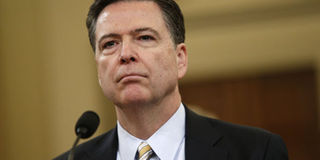TOUGH JUSTICE : Public hearings needed to enhance trust and accountability

former US FBI chief James Comey
What you need to know:
- Aside from all that’s happening locally, the UK election, Trump’s first foreign visit and the Nato summit, among others, made something of a great spectacle.
The last month was extremely politically charged. In fact, on May 30 when Netflix released the fifth season of its highly popular political drama, House of Cards, some avid enthusiasts like myself had lost all the excitement as we did not see the need to obsess over fictionalized politics in an already hyper-dramatic political scene.
Aside from all that’s happening locally, the UK election, Trump’s first foreign visit and the Nato summit, among others, made something of a great spectacle.
In the US, former FBI chief James Comey (pictured) and Attorney General Jeff Sessions’ Senate Intelligence Committee hearings concerning Russia’s intervention in the 2016 US elections also provided sufficient entertainment value over the last few days.
I followed the two Senate hearings, and in the process came out with greater appreciation for public hearings, especially in the context of what’s currently happening in Tanzania.
Right now Tanzanians are in a cloud of uncertainty over who to implicate for the dim history of our mining sector. Crucial documents that are supposed to be in the public domain have, for a long time, been kept secret, and this secrecy has played a big part in the corruption that is being unearthed now in the sector. Therefore, in order to avoid making the same mistakes again, and set ourselves on a new course, we must embrace greater transparency and shun secrecy, by hook or by crook.
Going forward we should make sure that issues of grave national interest are never carried out under the cover of night. For starters, instead of holding closed-door hearings for all those implicated in the minerals saga, public hearings should be held. This is important, and I explain why below.
Public hearings will make it harder for leaders to conspire to hide or censor truth. Let’s not forget that this concerns people who have held or still hold some of the highest offices in the land, and they can easily pull some strings to get themselves out of hot water. It was no surprise when the President announced that some people attempted to reach out to his committee members in order to doctor their report.
On the other hand, the government has made it clear that former presidents are not to be touched, and the defence being used is that their names were not included in any of the reports by the special committees commissioned to investigate the mineral sands saga. Therefore, a closed-door hearing will likely result into partiality in serving justice as there already seems to be precedence for shielding former presidents from shame, blame or prosecution, regardless of whether or not they actually had a part to play.
This type of censorship not a new or unlikely thing to happen. In Kenya, President Kenyatta had been accused of censoring some parts of the land chapter in a report by the Truth, Justice and Reconciliation Commission set up to move the country forward after a troubling past. It is only on the basis of truth that a society can truly heal from a troubling past, and public hearings stand a better chance of delivering something closer to the truth we want.
After all, the biggest losers in the saga are we, the citizens whose development has been derailed for far too long due to the negligence or corruption of a few elite people. Hence, instead of trusting other elite individuals to hear and interpret the truth on our behalf, we deserve a full and first-hand account of events.
This is also a rare opportunity to instil the long-lost sense of accountability in our people and to slap the fear of god back into our leadership.
It is an opportunity to announce that gone are the days when offenders who cause the country such losses of historic proportions can simply walk free. They’ve had their (un)fair share of freedom. We too are demanding ours. The truth, regardless of how ugly it is, is what will set us free.




